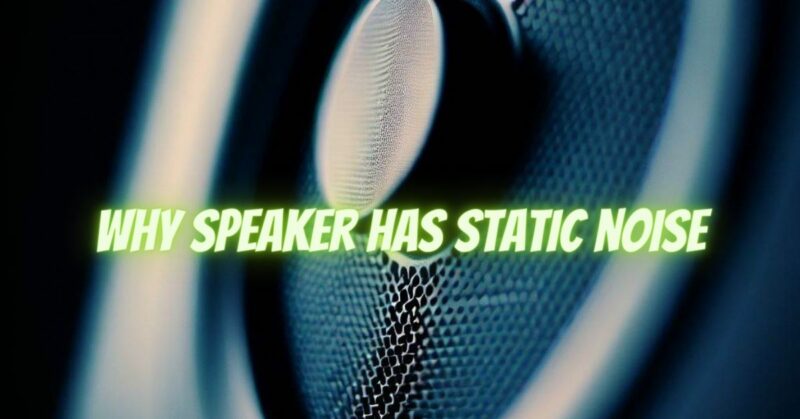Static noise coming from speakers can be an annoying and frustrating issue that can affect your audio listening experience. Understanding the potential causes of static noise and how to troubleshoot them can help you resolve the problem and enjoy clean and clear sound from your speakers. In this article, we will explore some common reasons for speaker static noise and provide practical solutions to address the issue.
- Interference from Nearby Electronics:
One of the primary causes of speaker static noise is interference from nearby electronics. Electrical devices such as mobile phones, routers, fluorescent lights, or even appliances can introduce electromagnetic interference. Try moving your speakers away from these devices or turning them off temporarily to see if the static noise reduces or disappears.
- Poor Cable Connections:
Loose or damaged cable connections can also result in static noise. Ensure that all audio cables connecting your speakers to the audio source, such as a receiver or amplifier, are securely plugged in. Check for any frayed or damaged cables and replace them if necessary. Additionally, make sure the cables are not running alongside power cables or other sources of electrical interference.
- Grounding Issues:
Improper grounding can cause static noise in speakers. Ensure that your audio system is properly grounded, especially if you live in an older building with outdated electrical wiring. Consider using a ground loop isolator, which can help eliminate any ground loop issues that may be causing static noise.
- Amplifier or Receiver Problems:
An amplifier or receiver that is not functioning correctly can introduce static noise to the speakers. Check the amplifier or receiver for any visible signs of damage, such as blown capacitors or overheating. If possible, try connecting the speakers to a different amplifier or receiver to see if the static noise persists. If the issue is isolated to the amplifier or receiver, it may require repair or replacement.
- Speaker Placement:
The placement of speakers can also contribute to static noise. Ensure that the speakers are placed on stable surfaces and are not too close to walls or corners, as these can cause reflections and interference. Experiment with different speaker placements to find the optimal position that minimizes static noise.
- Environmental Factors:
Environmental factors such as electrical storms or power fluctuations can introduce static noise to speakers. In such cases, the static noise is often temporary and resolves itself once the environmental factors subside. If you frequently experience static noise during specific weather conditions, consider using a surge protector or a power conditioner to protect your audio equipment.
Conclusion:
Static noise from speakers can detract from your audio experience, but with proper troubleshooting, you can identify and resolve the underlying causes. By addressing interference from nearby electronics, checking cable connections, ensuring proper grounding, inspecting amplifiers or receivers, optimizing speaker placement, and considering environmental factors, you can minimize or eliminate static noise. Remember to be patient and methodical during the troubleshooting process, and if the issue persists, consult with a professional audio technician for further assistance. Enjoy clean and crisp sound from your speakers once again!


